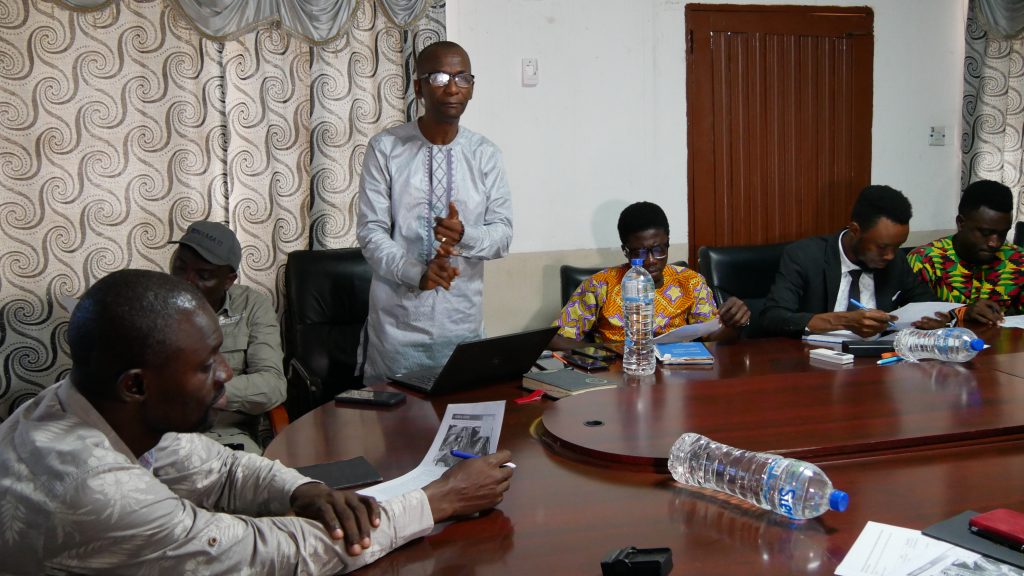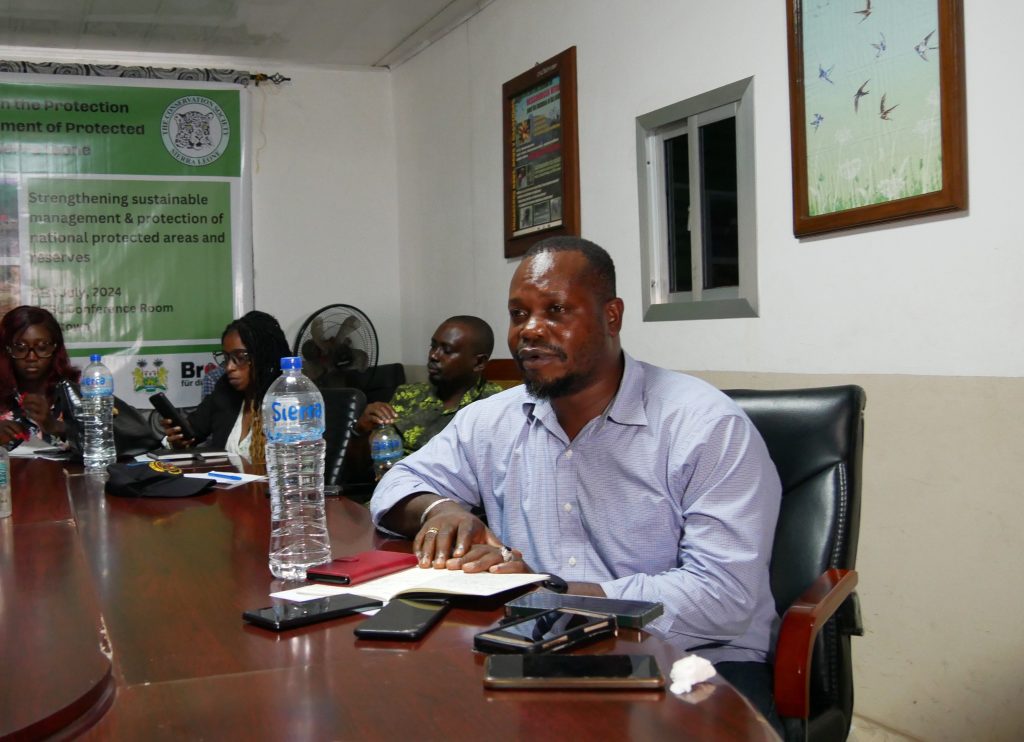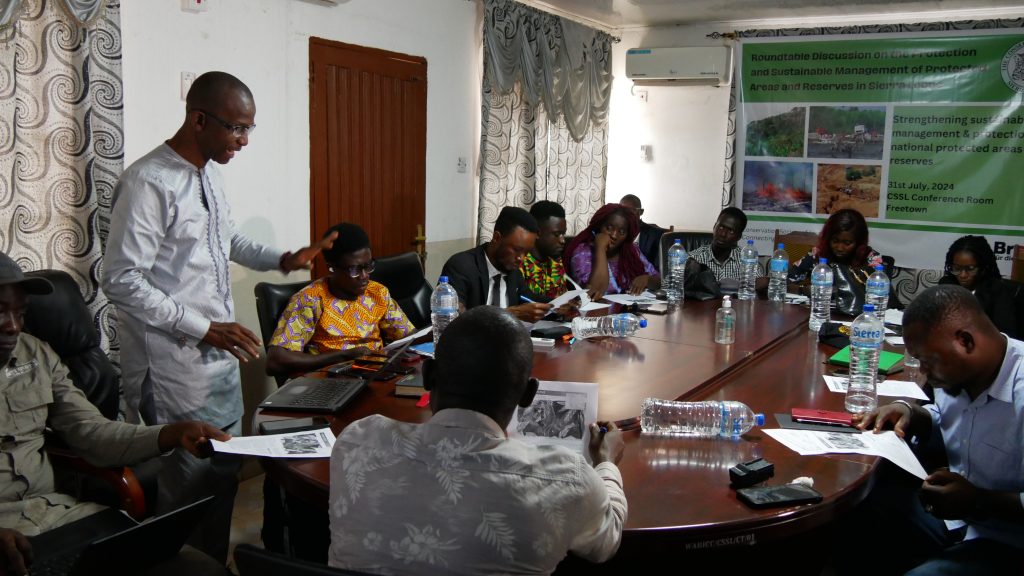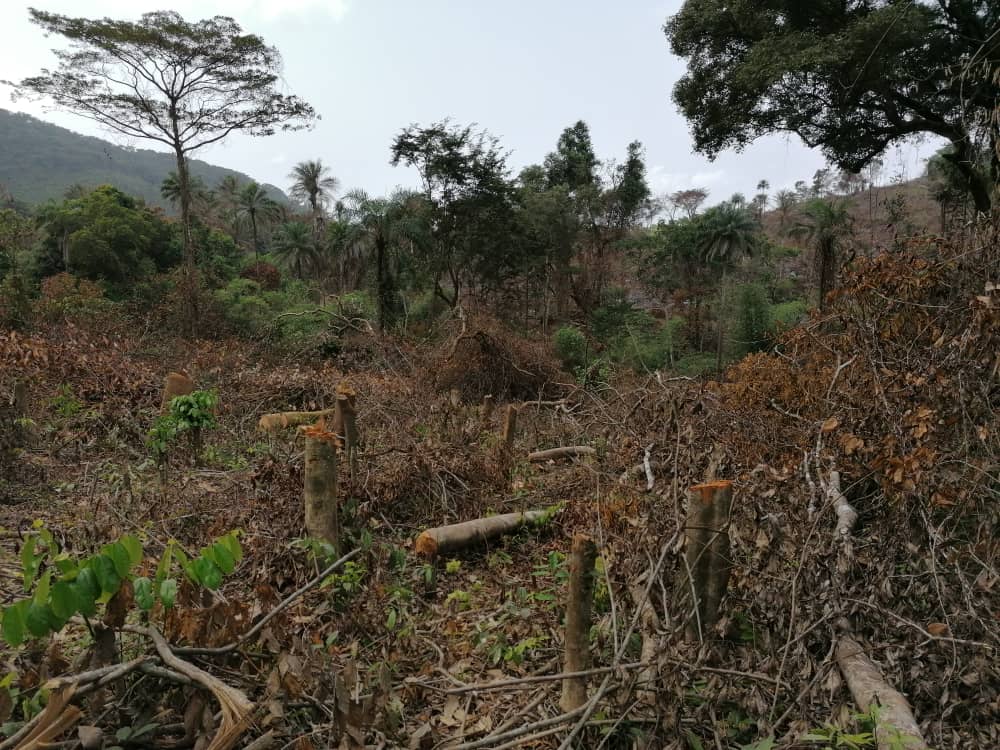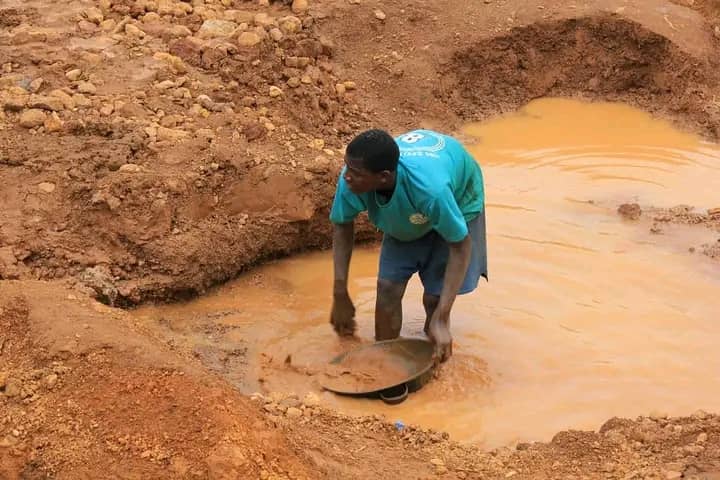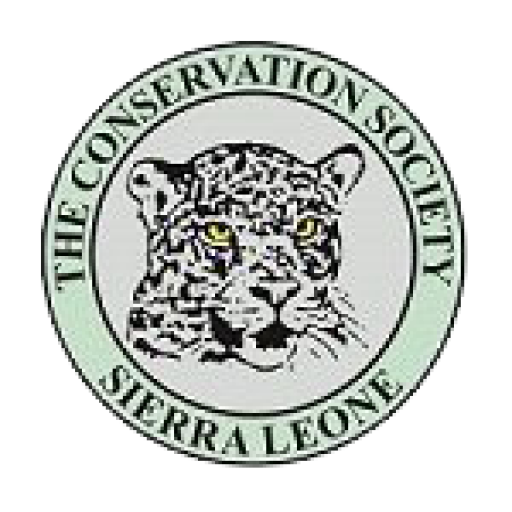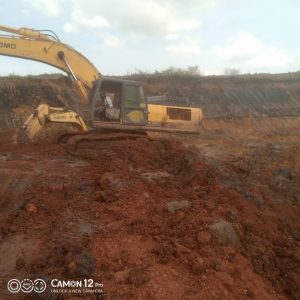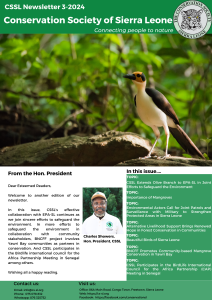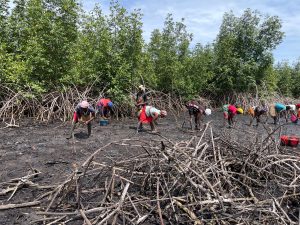“Our national reserves have lost about 10,103.4 forest areas, and we still continue losing more trees and forests to unregulated human activities. As this spate continues, more carbon dioxide and other dangerous gases are lodged into the atmosphere which increases the global climate crises”, laments, Edward Momodu Sesay, Head of Programmes at CSSL during a roundtable discussion organised by his organisation in Freetown on July 31, 2024.
Sierra Leone’s protected areas and reserves host a significant population of West African chimpanzees, the black and white colobus monkey, the brush-tailed porcupine, and Maxwell’s Duiker — a small antelope, populations of the extremely rare pygmy hippopotamus, West Africa Dwarf Crocodile, and a large variety of rare native and migratory birds. These sites including Gola Rainforest Nationa Park, Kambui Hills Forest Reserve, Loma Mountains, Lake Sonfon, Outamba-Kilimi National park, the Western Area Peninsula National Park, Yawri Bay and Sierra Leone River Estuary among many others, have numerous important economic and social benefits. Such benefits include providing ecosystem services such as clean water, non-timber forest products and fish nurseries; supporting the country’s young ecotourism industry; and preserving leisure spaces for Sierra Leoneans themselves.
However, some of these lush forests and Marine Protected Areas currently face existential threat from anthropogenic activities including timber logging, mining, housing, over-fishing, mangrove cutting for fish smoking, among others.
Over the years, the Conservation Society of Sierra Leone (CSSL) has been working with designated government institutions under the Ministry of Environment and Climate Change including the National Protected Area Authority (NPAA), the Environment Protection Agency (EPA-SL), Forestry Division, etc., the Ministry of Agriculture, communities and like-minded environmental civil society organisations to protect and sustainably manage these sites. But year in year out, additional threats keep emerging from communities, individuals as well as companies interested in exploiting the minerals hosted in these sites. This is much to the detriment of the population living around that largely depend on the ecosystem services and other related services provided by the forests and marine environment.
To continue with its advocacy drive, CSSL organised a roundtable discussion for state and non-state actors on the protection and sustainable management of national protected areas and reserves.
Addressing participants, the Executive Director of CSSL, Dr. Sheku Kamara, asserted that, different organizations have different areas of focus; and CSSL’s priority is the protection of humans, and other animals with more preference to birds. He noted that if animals, especially birds go extinct, it would pose a significant threat to humans, and many would be left to wonder as to what might have led to their extinction or what would potentially happen to the human race in the near future.
Dr. Kamara furthered that, there was now a shift in semantics regarding what a protected area is, and what it is not. He therefore, re-emphasized the necessity for stakeholders to sit and discuss these issues, while also calling on the Ministry of Environment and its specialized agencies to come clear to the public on these differences.
He also lamented about the different mandates within the environment sector that tend to strangulate the overall efforts of government and partners in the protection of the environment. He called on the Ministry of Environment to strengthen collaboration among partners for the protection of the various national parks and reserves across the country.
The CSSL Communication Manager, Abdul Kaprr Dumbuya, screened four video documentaries that featured some critical sites in danger including the oldest National Park – Outamba-Kilimi National Park, Western Area Peninsula National Park, Yawri Bay and Lake Sonfon. Community members in the videos are very clear and insistent in their messages to government for stringent actions to stop the current onslaught of degradation of particularly the mangrove and terrestrial forests that is dwindling the population of the country’s endangered wildlife.
Ethel Sharon Sillah from GreenLife West Africa attributed the whole problem to ineffective planning from across the spectrum, and called on the government to step up in the fight against climate change. She referenced some excerpts of the documentaries where community people bitterly complained about lack of alternative livelihood support from the government; and the only means of their livelihood is either fishing, cutting of mangrove trees for fish processing and mining, among others. Ethel suggested that, in addition to improved collaboration within the sector, improving facilities for cold storage, optional fish-smoking like improved ovens, better stock delivery services, and many other key areas might help communities to increase their livelihood options. “There is also the need for government to review, strengthen and enforce our current environmental protection and biodiversity conservation laws. Defaulters should be seen to be dealt with by the laws”, she emphasised.
The representative from the NPAA, Ibrahim Sorie Kamara commended CSSL for putting together the documentaries on the sites. He noted that, his institution was working in close collaboration with CSSL in the protection of those sites.
Daniel Sesay from Namati said, if all the recommendations provided in the documentaries were implemented by government and communities, the country would surely grow in terms of mitigating the adverse effects of climate change. He suggested for government to make strong commitment to provide communities with about 50% of benefits generated from forest resources. He said, that would motivate them to support in forest protection.
George Rogerson from the Ministry of Environment and Climate Change said, since the ministry was established, policies including the Forestry Policy, National Environmental Policy, National Climate Change Policy, and the National Development-induced Resettlement Policy among others have been reviewed and/or developed to address environmental issues in the country. George assured that those efforts were also meant to improve decision making, promote and strengthen good governance for sustainable environmental management. “We must all work together to save this inheritance as we’ve all seen from the various ecosystems documented by CSSL across the country. We must all work together to save this inheritance for future generations”, he urged the assembly.
The engagement was described by all present as very timely and in the right direction. Participants were very frank in bringing out the issues, and proffering what looked like workable and actionable recommendations, key among others which was for government to establish joint patrols and surveillance with the military in all protected areas across the country. It is however the hope of everyone including CSSL for the Ministry of Environment and Climate Change to take the much-anticipated lead role in ensuring the right things be done to save our environment.
